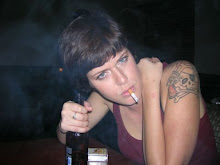Our world projects a very strong image of success. Especially in a capitalist nation such as ours, the “American dream” transcends all facets of our lives dictating what characterizes success and thus happiness. In the film “American Beauty” the lead character of Lester comes to grip with the meaningless of this hapless existence and thus enters what is socially deemed a mid-line crisis. All the while, his journey parallels that of his wife: a woman consumed with the image of success and the life afforded by it. This is by no means a new concept in life or in media. Tennessee Williams’ 1954 play “Cat on a Hot Tin Roof” tells a similar story of a man, Brick, struggling with the hypocrisy of a life comprised of lies and social graces while his wife, Maggie, tries to maintain the image of a normal existence. But what is normal? What is “right”? Is it these women who fight hand over fist to achieve a conservative capitalistic concept of success? Perhaps it is instead the men that choose to reject traditional values and sentiments and explore whether or not their lifestyle façade is really worth all the trouble it affords them.
Both stories are based around marriages that began as, or became, advantageously based situations. They serve only as an advertisement for projected normalcy. In Brick’s case, his wife Maggie attempts to convince him, his family, and ultimately herself that Brick is not the loathing, detached alcoholic he appears to be. In the case of “American Beauty”, Lester and Carolyn’s marriage falls into a system of rules and power exchange reminiscent of Michael Foucault’s concept of sexuality as the currency of power. When Lester chooses to divert from the role set forth for him as the provider, Carolyn responds in kind by withdrawing what was left of her affection for him. As she steps into the role of sole provider she accepts the notion that she is now in control. She emotionlessly insists that perfection and normalcy is within her control, transcending traditional gender stigmas by stepping into the function normally reserved for the male.
As the world around them deteriorates, our female leads both clamber for any sense of control over their relationships and the world around them. Maggie insists to Brick that he still loves her despite his obvious disdain and recommendation that she takes a lover. She goes on and on about her beauty and the power she believes she has over others, especially Big Daddy. As she tells the family that she is pregnant, it is almost as though she believes speaking it will bring it to past. Her words become a self-assuring mantra that, despite her current situation, everything will eventually turn out right. Similarly, Carolynne seeks flawlessness in everything from her matching gardening tools to her dinner ambience. Even when presented with romantic attention from Lester, she can’t detach her need for perfection long enough to ignore the prospect that his beer is about to spill on the Italian silk sofa. In a very poignant scene near the end of “American Beauty”, Carolynne drives home from the gun range singing passionately along to Bobby Darrin's “Don’t Rain on my Parade” aptly symbolizing her almost maddening desire to maintain the dream she had worked so hard to attain.
In contrast, Brick and Lester seem to view their wives’ desire for traditional success with little thought or interest. Brick rarely even responds to Maggie as she prattles on and on about family affairs. He seems vacant, as though the pettiness of the world around him has lost its hold. In the same way, Lester symbolically stares out the passenger window of his wife’s car he states, “In a way I’m dead already” (American Beauty). Our male leads also choose to disregard the common social graces that appear to dictate the actions of their spouses. Primarily it seems to arise from disillusionment with the present and a desire to regress to a simpler, happier time. Brick breaks his ankle trying to drunkenly jump the hurdles he had mastered in his youth. He tells Maggie, “…people like to do what they used to do, even after they’ve stopped being able to do it” (Williams 62). Similarly, Lester is first inspired when he sees Ricky quit his catering job on the spot. It reminds him of a time when his only responsibility was to get high and have sex. Subsequently, he decides to buy the car he always wanted, take a shit job, and smoke dope in his down time. Lester is pictured smoking a joint and rocking to the Who’s “American Woman” in a scene that starkly contrasts Carolynne’s car ride sequence symbolically rejecting the concept of capitalism and a life devoted to what is expected of you.
Traditionally people like Brick and Lester would be seen as social deviants: listless, intoxicated, and uninspired. American capitalist culture encourages ambition, success, and conformity, all characteristics that Maggie and Carolynne embody. However, the achievement of the American dream seems strongly rooted in the denial of self gratification. As the characters of both Cat on a Hot Tin Roof and “American Beauty” illustrate happiness is not a byproduct of success. “This isn’t life, it’s just stuff” Lester tells Carolynne when she chooses her carefully crafted world over romance. Her life is so intensely rooted in “projecting the image of success” that emotion is entirely removed from her decision making process. Is it not more gratifying to live and truly feel, even if those feelings are pain and remorse?
WORKS CITED
American Beauty. Dir. Sam Mendes. Dreamworks. 1999.
Foucault, Michael. “The History of Sexuality.”
Truman. Breakfast At Tiffany’s. New York: Penguin Books, 1958.
Subscribe to:
Post Comments (Atom)

No comments:
Post a Comment